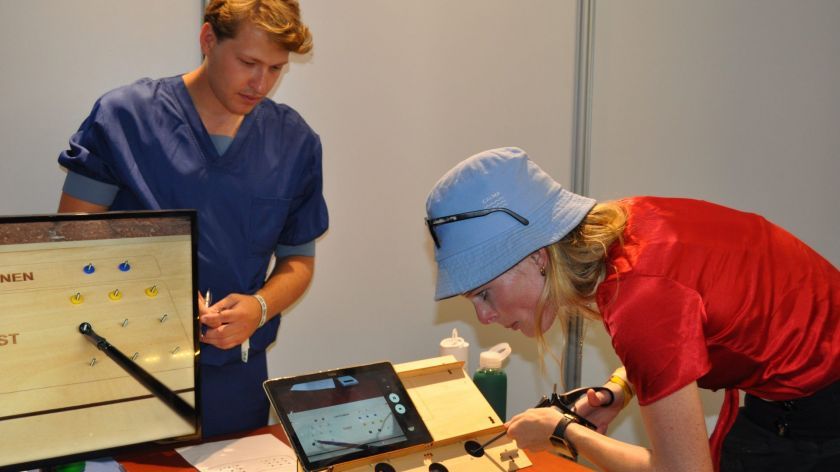A surgeon who’s been drinking? Skills only really get worse from a blood alcohol level of 0.8‰
-
 The research at Lowlands. Photo: Radboudumc
The research at Lowlands. Photo: Radboudumc
It's not particularly surprising: the more you drink, the less precise you become when you're at an operating table. However, pediatric surgeon Bas Verhoeven published an article about it. The reason: he investigated the link between alcohol and surgical skills among 1,056 festival-goers at Lowlands Science. 'But we should be more worried about drugs.'
In August 2022, more than a thousand visitors to Lowlands entered the Science container to fiddle with surgical instruments. They had to move small rings. Beforehand, they filled out a questionnaire about how much they had drunk and slept, what substances they had used, and they took a breathalyser test.
Blood Alcohol Level
Bas Verhoeven, a pediatric surgeon at Radboud University Medical Center, was one of the supervisors of the experiment. Although the outcomes were not surprising – the more alcohol, the clumsier the ‘surgeon’ – he still wrote an article about it. Along with colleagues, including his son Daan Verhoeven, he published the results in Heliyon, an open-access journal.
‘Festival-goers can still perform simple surgical tasks just fine as long as they stay under 0.5‰ blood alcohol level’
‘It’s interesting to see that festival-goers can still perform simple surgical tasks just fine as long as they stay under a blood alcohol level of 0.5‰,’ he says. ‘But if they have more than 0.8‰ in their blood, their skills significantly deteriorate.’
Off-Duty Work
Medical protocols require that surgeons should not consume any alcohol if they still have to work. But it does happen that a doctor is asked for assistance outside of work hours. This might be a surgeon – maybe one of the few specialists in a specific area – who is at a party when a colleague calls for help.
This doesn’t necessarily mean the doctor has to perform the surgery themselves, as they might just provide advice to others in the operating room. However, it is possible for a doctor with alcohol in their system to enter the hospital.
Alcohol standards are less strict in countries outside the Netherlands. In the US, UK, and Australia, guidelines say that a surgeon should not show up to work if alcohol could negatively affect their performance. The question is, of course, when does it become an issue? Verhoeven thinks the rules could use tightening, especially since it’s known that medical specialists drink more than the general population, and surgeons often enjoy an extra drink.
Drugs
‘But we should be more worried about drugs,’ Verhoeven says firmly. ‘At Lowlands, I saw names of substances I didn’t even know. We have no idea what their effects are.’
Initially, the researchers from Nijmegen at Lowlands in 2022 also wanted to study the influence of drugs on surgical skills, but they eventually decided against it due to the sheer variety of substances involved.
‘To what extent do drugs endanger patient safety?’
The fact is that the new generation – including future surgeons – uses a variety of drugs for which there are no established protocols from the medical federation KNMG. ‘To what extent does this endanger patient safety?’ Verhoeven asks aloud. ‘If we don’t know how long certain substances remain active in the body, how can we be sure that a doctor who took some pills at a party is fit to work?’
He believes that this requires further research, but as a pediatric surgeon, this falls outside his area of expertise. He hopes that other researchers will take up the task.
Translated by Nick Fidler



